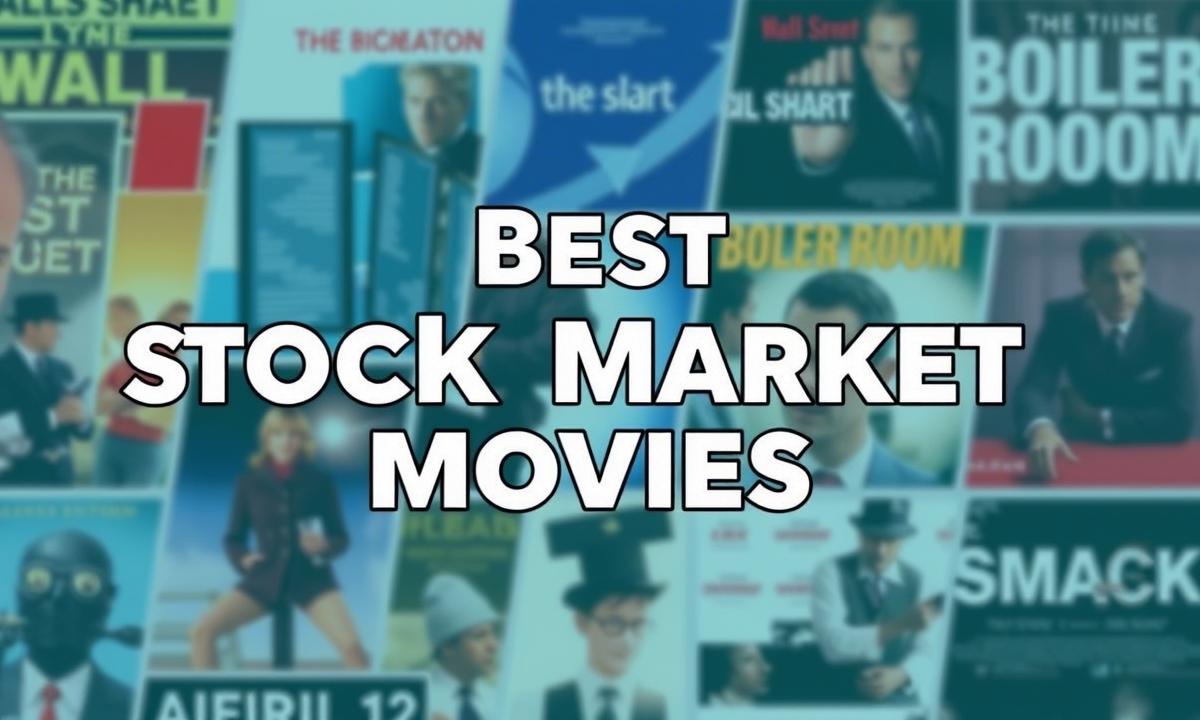What do Leonardo DiCaprio, Michael Douglas, and a Bollywood ‘Big Bull’ have in common? They’ve all brought the chaotic world of stock markets to life on the big screen. Stock market movies have captivated audiences worldwide, offering a thrilling glimpse into the high-stakes world of finance. These films combine entertainment with education, making complicated financial ideas understandable and creating stories that resonate with viewers.
From The Wolf of Wall Street to Wall Street, these films have shaped public understanding of financial markets, trading strategies, and the human dynamics within the industry. They serve as powerful tools for:
These films do more than just entertain – they can influence career choices, investment decisions, and regulatory reforms. Through dramatic storytelling and outstanding performances, stock market movies have made finance easier to understand while warning viewers about the dangers of unchecked greed and market manipulation.
In this ranking, we’ll look at ten remarkable films that have greatly influenced our understanding of financial markets and the human stories behind them.
Read More: Best Dystopian Movies of All Time: Ranked and Reviewed
Martin Scorsese’s The Wolf of Wall Street brings Jordan Belfort’s audacious true story to life through Leonardo DiCaprio’s electrifying performance. This dark comedy chronicles Belfort’s meteoric rise from a Wall Street newcomer to a wealthy stockbroker, built on a foundation of fraud and corruption.
Box Office Success & Critical Acclaim:
The film pulls back the curtain on the excessive lifestyle of 1990s Wall Street traders. Through Belfort’s Stratton Oakmont firm, viewers witness:
Key Lessons from Belfort’s Downfall:
The film’s raw portrayal of financial excess serves as a cautionary tale for modern investors. Belfort’s journey from stockbroker to federal convict illustrates how the allure of quick wealth can corrupt moral judgment and lead to devastating personal and professional consequences. It is in the Best Stock Market movies of the 20s.
Read More: Top Disney+ Hotstar Subscription Plans for 2025: Price, Validity, and Access to Series and Movies Online
Inside Job (2010) Full Movie ⬆️⬆️⬆️⬆️
Inside Job, narrated by Matt Damon, is a powerful exposé of the 2008 financial crisis. This Academy Award-winning documentary directed by Charles Ferguson received widespread critical acclaim for its detailed investigation into Wall Street’s catastrophic collapse.
The film breaks down the complex relationships between financial institutions, credit rating agencies, and regulatory bodies that played a role in the crisis. Through expert interviews and thorough research, it reveals:
The documentary’s findings paint a grim picture of the banking sector’s deep-rooted problems:
“The financial services industry has effectively captured our government” – Interview subject in Inside Job
Key Systemic Issues Uncovered:
The film’s examination of transparency failures highlights critical lessons for maintaining market stability:
Inside Job received universal praise for making complex financial concepts accessible to general audiences. Its box office success ($4.3 million domestic) demonstrated public interest in understanding the mechanisms behind financial crises. The documentary secured the 2011 Academy Award for Best Documentary Feature, cementing its place as a definitive account of the 2008 financial collapse.
Moneyball is a powerful example of how data-driven decision-making can challenge traditional beliefs. Based on Michael Lewis’s bestselling book, the film stars Brad Pitt as Billy Beane, the general manager of the Oakland Athletics, who changed baseball management forever with his use of statistical analysis.
The film received widespread praise, earning six Academy Award nominations, including Best Picture and Best Actor for Pitt’s role. With a global box office gross of $110.2 million, Moneyball proved that even complex analytical ideas could capture the attention of mainstream audiences.
The story follows Beane as he teams up with Peter Brand (Jonah Hill), a Yale economics graduate, to create a competitive team despite having limited funds. Their strategy involved:
This approach is similar to successful value investing strategies in the stock market:
The film’s depiction of systematic analysis transforming an industry resonates strongly with modern investment approaches. Like Beane’s Oakland A’s, successful investors often find value in overlooked opportunities by challenging conventional wisdom and trusting data-driven insights.
Moneyball shows us how innovation in analytical methods can disrupt traditional practices, giving an edge to both sports teams and financial markets. Its influence goes beyond baseball, inspiring professionals in various fields to adopt statistical analysis for making strategic decisions.
Set during the early stages of the 2008 financial crisis, Margin Call offers a gripping portrayal of Wall Street’s darkest hours. The film features an exceptional cast including Kevin Spacey, Paul Bettany, Jeremy Irons, and Zachary Quinto, who bring to life the intense drama of an investment bank’s desperate struggle for survival.
Director J.C. Chandor’s debut feature received critical acclaim for its authentic depiction of the financial sector’s inner workings. It was nominated for an Academy Award for Best Original Screenplay and praised for its tight storytelling and nuanced performances.
The story unfolds through the eyes of key employees who discover their firm holds toxic assets that could lead to its downfall. Their moral compass is tested as they face difficult decisions:
The film skillfully explores the human cost of risk management failures through several powerful scenes:
Margin Call serves as a stark reminder of the dangers of excessive borrowing and the importance of strong risk assessment protocols. The characters’ internal struggles highlight the delicate balance between profit-driven decisions and ethical responsibilities in the financial sector, offering valuable insights for modern investors and finance professionals.
Rogue Trader (1999) Full Movie ⬆️⬆️⬆️⬆️
Rogue Trader tells the true story of Nick Leeson, played by Ewan McGregor, whose unauthorized high-risk trading caused the dramatic downfall of Barings Bank, the oldest merchant bank in Britain. The film follows Leeson’s journey from being a clerk to becoming a successful derivatives trader in Singapore, where his initial achievements concealed growing losses that would eventually reach $1.4 billion.
Director James Dearden skillfully weaves a gripping narrative that remains surprisingly true to real-life events. The film received acclaim for its authentic portrayal of trading floor interactions and the mental pressures experienced by derivatives traders. McGregor’s nuanced performance captures Leeson’s transformation from an ambitious young trader to a desperate man ensnared in an ever-deepening web of deceit.
The film’s stark depiction of unrestrained risk-taking serves as a cautionary tale:
The collapse of Barings Bank demonstrated how a single trader’s actions could destroy a 233-year-old financial institution. The film’s depiction of Leeson’s spiral into high-stakes gambling with bank funds highlights the dangers of emotional trading and the critical importance of robust risk management systems.
Rogue Trader stands as a powerful reminder that unchecked ambition combined with insufficient oversight can lead to catastrophic consequences in financial markets. The film’s meticulous attention to historical detail makes it an essential watch for anyone interested in understanding the human factors behind major financial disasters. It is in the Best Stock Market movies of the 90s.
Oliver Stone’s Wall Street is a defining film that captures the financial excess of the 1980s. It tells the story of Bud Fox (Charlie Sheen), an ambitious young stockbroker who becomes enamored with the ruthless corporate raider Gordon Gekko (Michael Douglas). Douglas’s Oscar-winning performance brought to life an iconic character whose influence can still be felt in financial culture today.
The film’s impact on popular culture comes from its unfiltered portrayal of Wall Street’s cutthroat environment. Gordon Gekko’s infamous “Greed is good” speech became a rallying cry for a generation of traders:
“Greed, for lack of a better word, is good. Greed is right. Greed works. Greed clarifies, cuts through, and captures the essence of the evolutionary spirit.”
This philosophy sparked debates about capitalism’s moral implications that are still relevant today. The film’s stark depiction of insider trading, market manipulation, and ethical compromises serves as a cautionary tale about the seductive power of wealth.
The film’s lasting legacy lies in its warning about unchecked financial ambition. Its themes of mentorship gone wrong, the allure of quick riches, and the true cost of success continue to resonate with modern audiences. Wall Street remains essential viewing for anyone looking to understand the psychological dynamics behind financial markets. It is in the Best Stock Market movies of the 20s.
Adam McKay’s masterpiece The Big Short grossed over $133 million worldwide and earned five Academy Award nominations, including Best Picture. The film adapts Michael Lewis’s non-fiction bestseller about a group of financial outsiders who predicted and profited from the 2008 housing market collapse.
The narrative follows three separate but interconnected stories:
The film breaks down complex financial concepts through creative celebrity cameos:
Key financial insights revealed:
The film’s genius lies in its ability to transform dry financial concepts into digestible information while maintaining dramatic tension. Through its fourth-wall-breaking explanations and dark humor, The Big Short demonstrates why independent research and skepticism are essential for investors. The characters’ thorough investigation of the housing market reveals systemic corruption that major financial institutions either missed or willfully ignored.
Trading Places (1983) Full Movie ⬆️⬆️⬆️⬆️
Trading Places is a brilliant satire of Wall Street culture, skillfully combining comedy with sharp social commentary. The film follows Louis Winthorpe III (Dan Aykroyd), a privileged commodities broker, and Billy Ray Valentine (Eddie Murphy), a street-smart hustler, who become unwitting subjects in a twisted social experiment orchestrated by the wealthy Duke brothers.
The film’s brilliance lies in its exploration of nature versus nurture through the lens of financial markets. When the Duke brothers orchestrate a bet-driven scheme to swap the lives of these two men from opposing social classes, the result is both hilarious and thought-provoking.
Key elements that make this film resonate:
The film’s comedic brilliance shines through its portrayal of the trading floor chaos, particularly during the climactic commodities exchange scene. This sequence remains relevant today, demonstrating how market information – or misinformation – can trigger dramatic price swings.
The movie’s treatment of adaptability in volatile markets proves particularly insightful. Valentine’s street smarts translate surprisingly well to trading floor tactics, while Winthorpe’s privileged background fails to shield him from financial ruin – until both men learn to work together against a common enemy.
Trading Places earned $90.4 million at the box office and continues to serve as a testament to how the mechanics of financial markets remain fundamentally unchanged, even as trading technology evolves. It is in the Best Stock Market movies of the 20s and is also a funny movie.
Boiler Room is a gritty portrayal of Wall Street’s darker side, following the journey of Seth Davis (Giovanni Ribisi), a college dropout who joins the questionable brokerage firm J.T. Marlin. The film reveals the infamous “pump and dump” schemes that plagued the 1990s financial markets.
Director Ben Younger creates an intense atmosphere where young brokers work under extreme pressure. The film’s authenticity comes from its honest depiction of predatory sales tactics:
The film’s strength lies in its dual perspective – showing both the seductive appeal of quick wealth and the devastating consequences for victims of financial fraud. Through Seth’s moral awakening, viewers see the psychological toll of being part of systematic deception.
Ben Affleck delivers a memorable performance as the firm’s senior broker, whose famous “sell me this pen” scene has become a cultural reference point for sales training – but as a warning rather than inspiration.
Boiler Room serves as a cautionary tale about:
The film’s portrayal of aggressive sales tactics and market manipulation is still relevant today, especially with the rise of online trading and cryptocurrency schemes. Its raw depiction of predatory financial practices continues to teach viewers how to recognize and avoid investment fraud.
Based on Andrew Ross Sorkin’s bestselling book, Too Big To Fail delivers a gripping account of the 2008 financial crisis through the eyes of key decision-makers. The HBO film stars William Hurt as U.S. Treasury Secretary Henry Paulson, who faces the daunting task of preventing a complete economic meltdown.
The narrative unfolds as major financial institutions teeter on the brink of collapse:
Director Curtis Hanson masterfully captures the tension-filled rooms where financial titans and government officials wrestle with unprecedented decisions. The film excels at breaking down complex financial concepts into digestible segments, helping viewers understand the intricate web of relationships between banks, insurance companies, and government regulators.
The film received critical acclaim for its accurate portrayal of the crisis, earning 11 Emmy nominations and a Golden Globe nomination. Paul Giamatti’s portrayal of Federal Reserve Chairman Ben Bernanke adds depth to the understanding of monetary policy decisions during crisis periods.
Too Big To Fail serves as a stark reminder of the fragility of financial systems and the importance of regulatory oversight. The film’s detailed examination of government intervention during crisis periods remains relevant for understanding current economic policies and financial market dynamics.
India’s film industry has produced compelling narratives centered around the stock market, offering unique cultural perspectives on financial intrigue and market manipulation. These productions blend dramatic storytelling with real-world financial events that shaped the Indian economy.
This critically acclaimed web series chronicles the rise and catastrophic fall of Harshad Mehta, known as the “Big Bull” of the Indian stock market. The series meticulously details how Mehta exploited systemic loopholes in India’s banking sector during the early 1990s.
Key Elements of the Series:
The series stands out for its educational value, breaking down complex financial concepts through storytelling. It demonstrates how a combination of regulatory gaps, greed, and market manipulation led to one of India’s most significant financial scandals, resulting in a loss equivalent to $1.3 billion.
Director Hansal Mehta’s attention to detail brings alive the bustling streets of Mumbai’s financial district, capturing the essence of India’s stock market evolution from physical trading floors to modern electronic systems.
Bollywood’s stock market films reflect India’s economic liberalization in the 1990s when retail investing exploded alongside scams like Harshad Mehta Scam 1992 became SonyLIV’s most-watched series in 2020, sparking a 300% surge in Google searches for ‘Harshad Mehta’. It is in the Best Stock Market movies of Bollywood which came out in the 20s.
Big Bull tells the true story of stockbroker Hemant Shah, who is based on Harshad Mehta. The film explores the complex world of market manipulation through various means such as:
The story also emphasizes important investment lessons:
The film shows Shah’s rise to success and his eventual downfall, reminding us of the harmful effects of unethical practices in the market. Through its gripping narrative, Big Bull demonstrates how unchecked ambition can result in the loss of wealth and reputation in the stock market.
It serves as a cautionary tale about the dangers of manipulating payment systems and funds transfer activities, which are integral aspects of financial markets. This movie is the Second Stock market movies in Bollywood which came after Scam 1992: The Harshad Mehta Story
Baazaar offers a gripping look into Mumbai’s stock market, following the journey of Rohan Vinod, a small-town trader with big aspirations. The film’s unfiltered portrayal of power struggles and market manipulation is a stark reminder of the potential dangers in the financial world.
Director Gauravv K. Chawla weaves a narrative that sheds light on:
As the film’s main character navigates through a complex web of insider trading schemes, he learns difficult lessons about trust and integrity. Saif Ali Khan delivers a powerful performance as Shakun Kothari, the ruthless mentor, adding depth to this cautionary tale about the true price of pursuing wealth through unethical means.
What sets Baazaar apart is its authentic portrayal of Indian stock market culture, emphasizing the delicate balance between ambition and greed within the financial industry. This theme resonates with the broader context of financial behavior, highlighting how personal psychology can influence market dynamics.
Stock market movies are more than just entertainment; they are powerful educational tools that make complex financial concepts easy to understand. These films explain difficult terms like:
The visual storytelling in these movies helps viewers understand real-world financial situations through character-driven stories. Films like Inside Job explain systemic market problems, while Moneyball shows how data analysis can be used for investing.
These movies also teach important lessons:
By combining entertainment with education, these films become valuable resources for both beginner investors and experienced professionals looking for new ways to understand the market. After watching these films, audit your portfolio: Are you chasing ‘Wolf of Wall Street ‘-style hype, or building ‘Moneyball’-style value?
Stock market movies play a crucial role in shaping public perception of finance by dramatizing complex financial concepts and highlighting the ethical dilemmas faced within the industry. They provide insights into the risks and rewards associated with investing, while also reflecting societal attitudes towards wealth and ambition.
‘The Wolf of Wall Street’ (2013) follows the rise and fall of Jordan Belfort, showcasing his extravagant lifestyle and unethical practices in the finance industry. The film received critical acclaim and achieved significant box-office success. Key lessons include understanding the risks of speculative trading and recognizing the consequences of unchecked ambition.
‘Inside Job’ (2010) is a documentary that explores the root causes of the 2008 financial crisis, emphasizing systemic issues within the banking sector. It highlights the importance of transparency and accountability to maintain a stable monetary system, illustrating how a lack of oversight can lead to catastrophic economic failures.
‘Moneyball’ (2011) revolutionized baseball management through data-driven decision-making, which parallels investment strategies that focus on long-term value rather than short-term speculation. The film emphasizes identifying undervalued opportunities through analytical approaches, encouraging investors to adopt similar methodologies.
‘Margin Call’ (2011) delves into moral dilemmas faced by characters at an investment bank during a critical moment before collapse. The film highlights lessons on risk management and ethical conduct in finance, illustrating how decisions made under pressure can have far-reaching consequences for individuals and institutions alike.
‘Trading Places’ (1983) uses comedic elements to explore themes of social inequality through an elaborate scheme involving two traders from contrasting backgrounds. The film addresses the adaptability required in volatile markets and ethical considerations related to insider trading, resonating with audiences today as it critiques information asymmetry in finance.



